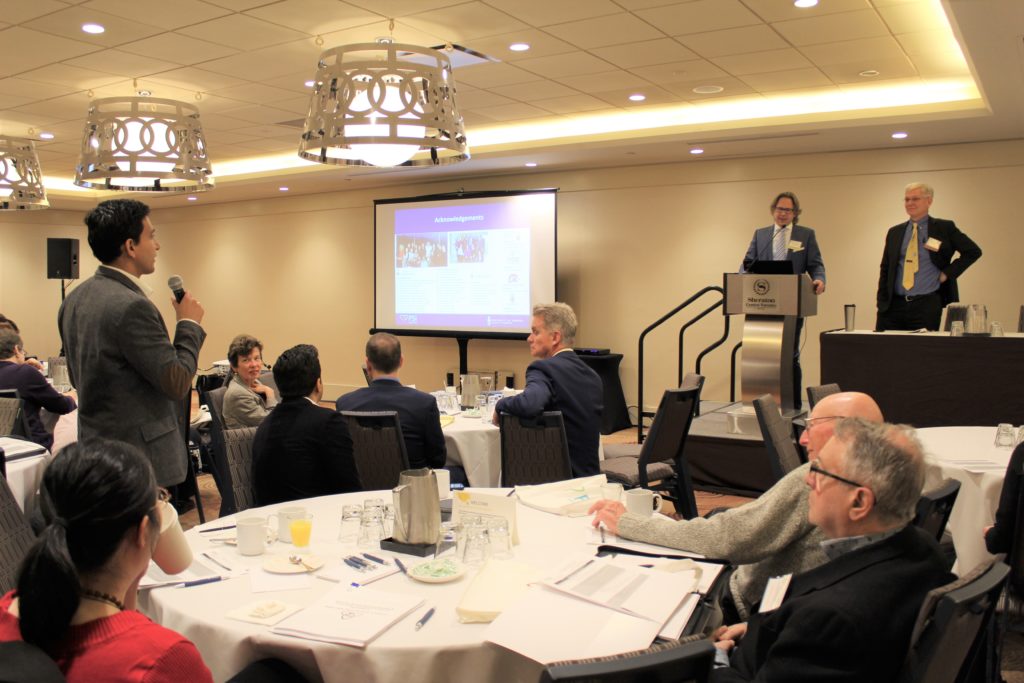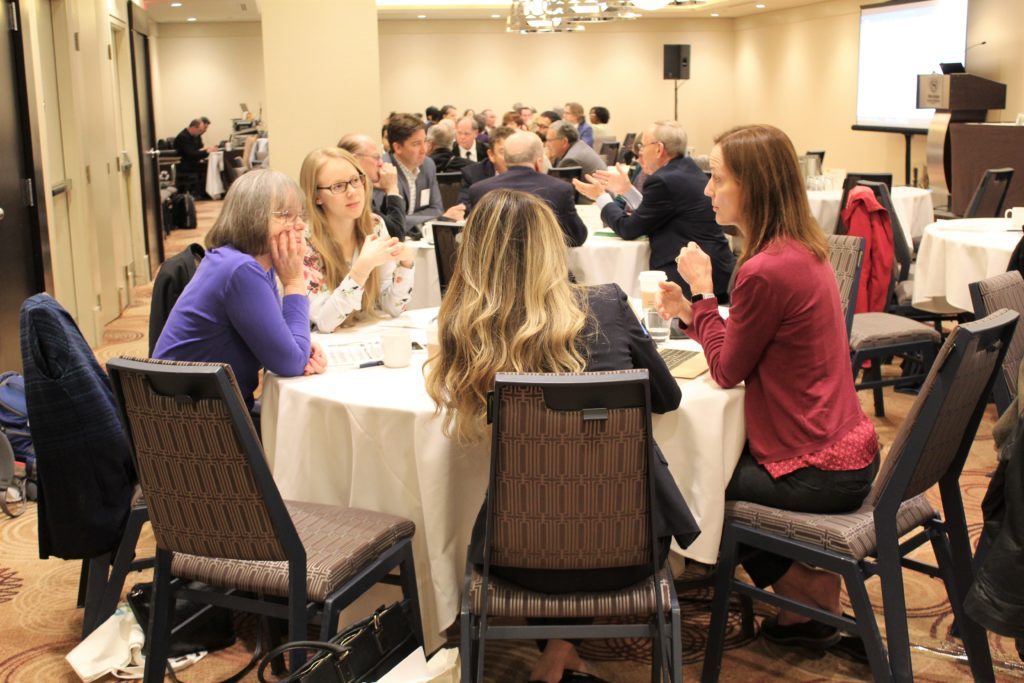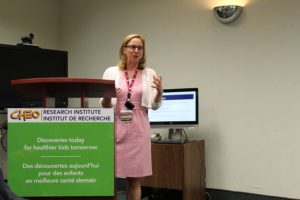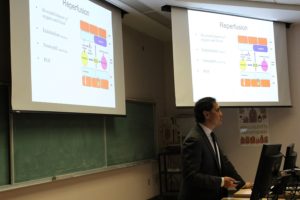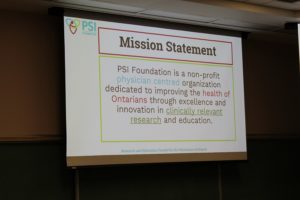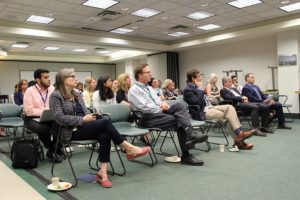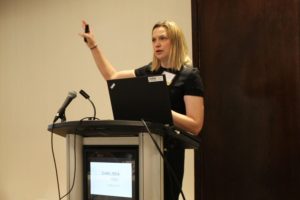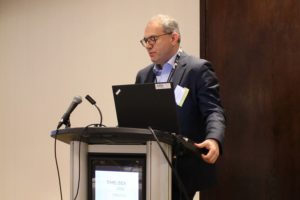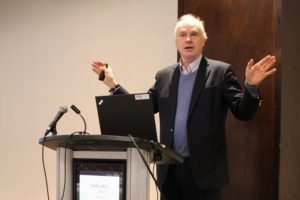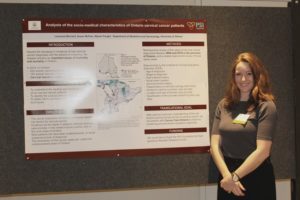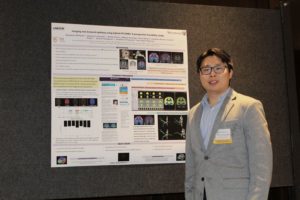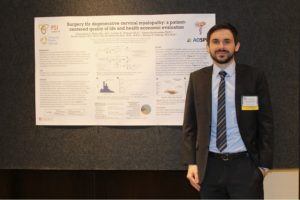After two years of pandemic push back, PSI opportunely welcomed back our grantees, committees, and doctors to the 2022 PSI Symposium. This year’s symposium included a full day of PSI activities, including a resident presentation by Dr. Raed Joundi, open-floor and roundtable discussions, and three certified and accredited educational presentations* by Dr. P.J. Devereaux, Dr. Deborah Cook, and Dr. John Marshall.
Our 2022 PSI Symposium begins as Dr. @CRobinWalker welcomes everyone. #PSISymposium2022 pic.twitter.com/nev1E8Q3Bi
— PSI Foundation (@PSIFoundation) June 2, 2022
The day commenced with PSI president Dr. Robin Walker giving his opening remarks for the first ever in-person symposium since 2019, updating attendees on PSI’s 2021 impact report and activities during the COVID-19 pandemic. Notably, PSI began a COVID-19 funding stream to maintain support for our researchers during the pandemic, all the while giving a one-year blanket extension on all research funded during that period. PSI also increased grants funding support salaries through the PSI Graham Farquharson Knowledge Translation (KT) Fellowship award.
NEW FUNDING OPPORTUNITY – PSI is pleased to launch the 2023 PSI Graham Farquharson Knowledge Translation (KT) Fellowship. Check out the full announcement & funding guidelines: https://t.co/f3EEyBIf2Y
— PSI Foundation (@PSIFoundation) March 22, 2022
PSI’s focus on Equity, Diversity and Inclusion (EDI) was discussed by Ms. Giselle Bodkin. Commenting on the state of EDI at PSI, Ms. Bodkin stated: “if you don’t consciously include people, you unconsciously exclude them” – our slogan to intentional inclusion as a research grants provider in the Ontario healthcare space. Ms. Bodkin walked us over the steps PSI has taken so far, including having grantees self-identify in order to analyze the statistics and fill in any missing diversity gaps with such data. With the newly instated EDI committee, PSI hopes to create a more inclusive, diverse space for our grantees.
PSI Governance Committee Chair Dr. John Drover presented a governance update, including what the committee will be focusing on for the next year. Dr. Drover’s focus is on revitalizing the governance committee to be more effective in support of research in Ontario. In regards to revitalization, Dr. Drover told the symposium that “we’ve been focusing on [next steps] to move us into the future.” This will be achieved in partnership with external firm Overlap Associates by utilizing strategic planning exercises in the upcoming months.
Our first presenter, Dr. P.J. Devereaux from @PHRIresearch @MacDeptMed, gives insight into the problems of perioperative complications. #PSISymposium2022 pic.twitter.com/k0wXQKYuu9
— PSI Foundation (@PSIFoundation) June 2, 2022
Our first presenter, Dr. P.J. Devereaux of McMaster University, focused on his Perioperative Care Program.
Dr. Devereaux discussed perioperative cover (silent) stroke and its association with perioperative and 1-year outcomes, understanding the effects of perioperative aspirin, and research for the relevance of atrial fibrillation and chronic incisional pain.
Dr. Deborah Cook of @StJoesHamilton @machealthsci shares personal experience and gratitude on PSI funding her research when she was a #NewInvestigator. #PSISymposium2022 pic.twitter.com/2rDuCuvycG
— PSI Foundation (@PSIFoundation) June 2, 2022
Our second presenter, Dr. Deborah Cook of McMaster University, gave a heartfelt presentation on how opportunities for early career investigators make a difference in their career: including how PSI helped to fund one of Dr. Cook’s studies early on in her career. “In most studies, the same senior investigators do the work. PSI focuses on enabling new investigators – I was one of them. It was the first validating grant I’ve received,” she noted.
Dr. Cook commented on PSI’s support for her over the years, stating that groups have an organizational culture. “I think of the way a personality is to an individual, organizational culture is to a group,” she said. “I was struck early on by the open-minded, communicative approach of [Executive Director] Sam Moore through PSI, and learned a little more of the organizational culture beyond the myth and the vision that is being actively refreshed.”
Dr. Cook then focused on three women physician-led PSI funded studies that made impactful changes in the critical care realm: including Dr. Jennifer Johnson’s study on probiotics in the immunocompromised, Dr. Joanna Dionne’s study on diarrhea, and Dr. Brittany Dennis’ study on end-of-life care during the pandemic.
Dr. Raed Joundi of @MacDeptMed and @HamHealthSci presents his 15-year study of temporal trends in #stroke incidence and outcomes in Ontario. #PSISymposium2022 pic.twitter.com/sR1ohAlO3I
— PSI Foundation (@PSIFoundation) June 2, 2022
PSI Resident Research grantee, Dr. Raed Joundi, presented his 15-year study on temporal trends in stroke incidence and outcomes in Ontario. Dr. Joundi thanked PSI for the support he received, which he ascribed as vital to establishing his career early on.
Presenter Dr. John Marshall of University of Toronto spoke about PSI’s three decades of support in his research, and how, as he stated: “support from PSI Foundation has been critical to allow [him] to move forward” in his research since the early 1990s. His presentation included the topic of how biomedical research in critical care can change medical practice and patient lives. Dr. Marshall’s first funded research project looked into the role of gut liver axis in the pathogensis of Multiple Organ Failure. “I see PSI as the seed that can allow grant visions to take shape…my first funding came from PSI Foundation,” he said.
Dr. John Marshall's first funded research project looked into the role of gut liver axis in the pathogensis of #MultipleOrganFailure. #PSISymposium2022 pic.twitter.com/N6rzCij2jW
— PSI Foundation (@PSIFoundation) June 2, 2022
Dr. Marshall spoke of the importance and “extraordinary power” of collaboration; especially that of PSI’s collaboration with grantees, peer reviewers, and researchers; and how it is vital to furthering the world of medical research. With the analogy of the Hubble Space telescope and an “unprecedented collaboration of scientists,” Dr. Marshall connected PSI’s grants funding streams to how PSI has helped further research – especially during the COVID-19 pandemic.
A panel discussion was then hosted by panelists Dr. John Marshall, Dr. Andrea Gershon, Dr. Naana Jumah, Dr. Ishrat Husain, and Dr. Deborah Cook. This discussion was based on key guiding questions, such as ‘what the future of physician-led medical research should look like,’ ‘what role physicians should play in shaping the future of medical research,’ and ‘what the greatest challenges and opportunities facing clinician researchers are now and moving forward.’ PSI has taken into account the feedback provided to us from these needed discussions, and plan to integrate it into our organization moving forward.
Watching these inspiring folks who continue to transform the way we derive questions, design studies, and provide funding models which support the modern needs of brilliant and budding researchers across Ontario! @PSIFoundation thanks for supporting our work during #COVID19 pic.twitter.com/cMb3BBwvuL
— Britt Dennis (@BrittanyBDennis) June 2, 2022
More @MacDeptMed content @PSIFoundation #psisymposium2022 — from Dr. Deborah Cook! Great learnings and perspectives. 💯📈 pic.twitter.com/TmPWDX1pnq
— Shawn Mondoux (he/him) (@DrShawnMondoux) June 2, 2022
We thank all who attended our symposium this year. PSI will continue striving towards fulfilling our mission of improving the health of Ontarians, through the support of physician-led research and education in the years to come.
Check out our YouTube playlist for exclusive video content from the PSI 2022 Symposium.
*This event is an Accredited Group Learning Activity as defined by the Maintenance of Certification Program of the Royal College of Physicians and Surgeons of Canada, and approved by the Continuing Education and Professional Development Office at the Northern Ontario School of Medicine.

